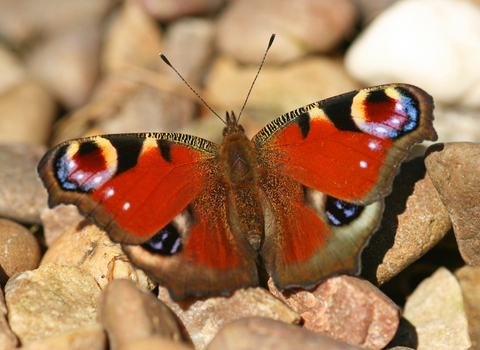
Peacock ©Rachel Scopes

Peacock ©Terry Whittaker/2020VISION
Peacock
The markings of the peacock are unmistakeable - big, blue 'eyes' just like a peacock's tail feathers. It can be seen feeding on flowers all year-round during warm spells, and overwinters as an adult.
Enw gwyddonol
Aglais ioPryd i'w gweld
January to DecemberTop facts
Ynghylch
A strikingly beautiful, red butterfly, so-named for the large blue and yellow 'eyes' on each upperwing that bare a marked resemblance to the tail feathers of a peacock. It is on the wing throughout the year, having a single brood, and overwinters as an adult. A very common butterfly, the peacock is a regular visitor to our gardens where it feeds on buddleia and other flowers. It ranges far, however, and can also be found in the shelter of woodland rides and clearings. The caterpillars feed on common nettles.What to look for
Perhaps our most familiar butterfly, the peacock is deep-red with black spots and blue 'eyespots' on both the forewings and hindwings. Its underside is dark brown, making the wings look like dead leaves.Where to find
Widespread.Roeddech chi yn gwybod?
When alarmed, the peacock is able to make a hissing noise by rubbing its wings quickly together. Coupled with its huge eyespots, it becomes a scary prospect for would-be predators.Gwyliwch
Peacock (https://vimeo.com/477633853)
Peacock butterfly on blossom ©Tom Hibbert
